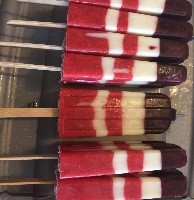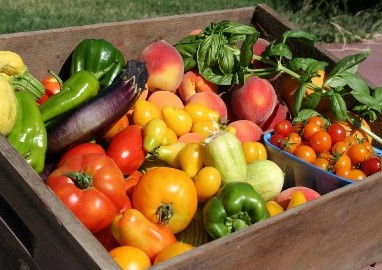
De La Luna Creamery
Down on Old Hwy 135 near Corydon, Indiana Caroline Kesten keeps goats, gardens and ingenuity well fed and watered. De La Luna Creamery was started seven years ago, with a passion for goats and the land. Kesten’s heard of Lamancha Goats has grown to thirty-five over the years. The milk from these goats become hand crafted goat cheeses and are the primary products of the creamery, which has expanded to include heirloom vegetables, herbs, cut flowers, and eggs from free range chickens. It is the dream of a lifetime for the farmer who has studied civil and environmental engineering at the University of Louisville, and has worked on soil structural dynamics at Qore Sciences. “It all kind of evolved, from this into that” Kesten says about the growth; “The farm has turned into what it is today by the research and development of new products”.

According to Indiana Grown, a statewide, all-inclusive collaborative program promoting Indiana-produced agricultural products, the demand for locally made products is at an all-time high. Began by the Indiana State Department in the summer of 2015, the Indiana Grown Initiative helps Indiana farmers and producers gain a larger market share. According to IndianaGrown.org, only ten percent of the $16 billion food purchased annually in Indiana is sourced from Indiana, while Indiana is the tenth largest farm state in the country. The grass roots farming of the food to table movement requires savvy, resilient and resourceful players that are open to the changes that come, whether it is regulation, innovation or the weather.
The development and marketing of new products will bring a larger market share to the farmers’ markets. This kind of resourcefulness is not lost on De La Luna Creamery. Just this past summer, many tomato crops throughout southern Indiana failed because of the heavy spring rains. Simple weather trends affecting the bottom line are common challenges for farmers. For Kesten, tomatoes are solid money makers at market, so there was empty table space that needed to be filled with something that would sell.
With a little research into an idea that would take advantage of a surplus of fruit and only require an initial cost of purchasing popsicle molds, Gourmet Popsicles were born! And what a hit at the farmers’ market! The new idea was successful at bridging the financial gap left open when the tomatoes failed. Even though Gourmet popsicles are all over Pinterest and trending like mad on foodie sites, Kesten was able to manage the production and have the insight into to know how it would play in the market. Although Caroline Kesten herself would tell you she was more surprised than anyone when the popsicles did so well, she cannot deny the fact that she knew enough to find the solution and to take the chance. Kesten’s knack for value engineering, packaging and marketing is establishing simplicity as a sophisticated brand; her continual research into new products is good business. It certainly paid off last year.
This year’s growing season is upon us. Plans for an on-farm cheese facility have been in the works for a while and the hope is that 2017 will be the year that it will happen. The facility is needed to contain all the production of the artisan cheeses to the farm itself; saving both time and money. But because of the strict regulations on kitchen’s that produce publicly sold food, Kesten has considered different fundraising opportunities that can help her achieve this expensive endeavor. The cheese made by De La Luna Creamery is currently made in rental kitchens that are already inspected and approved by the state inspectors. Church kitchens, civic centers and community organizations all provide legally approved facilities to their communities for use at a cost. The facility planned for De La Luna, once complete, will offset the rental and transportation cost, while also saving valuable time needed for other work on the farm.

For the farming entrepreneur, knowing your way around the computer and internet are imperative. The business of farming has seen innovation in fundraising. There are social media driven fundraising opportunities available for the farmer entrepreneur who has project focused financial need. On websites like Barn Raiser , GoFundMe , and Kickstarter, any project, work related or not, can be posted to find people who might be interested in putting money towards your particular project. The donations are handled right there on the website.
Caroline Kesten’s De La Luna Creamery will be back at the Corydon Farmers’ Market this spring on Friday evenings at 4pm on 124 S. Mulberry St. Corydon, IN. The vendors listed on the website represent a wide variety of natural, sustainable and healthy food products. Consider buying local food from your neighbors, it might influence a healthier eating habit.